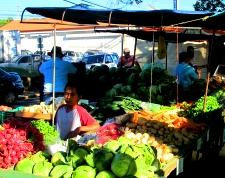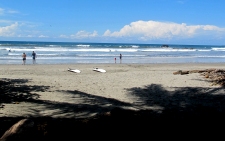When you consider the phrase, “The Good Life,” what comes to mind? For most, it’s sunsets on beaches, hammocks on warm afternoons, and exotic nature encircling you. Maybe they would add fruit falling from the trees, pleasant people, and something that would make this dream an actual possibility—affordability. An important factor of living a good life, is that you are financially comfortable in it. Not so easy, right? Wrong. These images can lift off the pages of your imagination and settle themselves in reality, if you let them. There are places that meet the above description all over the world, but one place that connects them with the added bonus of easiness is Costa Rica. The atmosphere is laid-back, the cost of living is affordable, and daily life in this land is indeed easy.
 The people of Costa Rica call themselves “Ticos,” and they boast about running on a different time clock, “Tico Time.” I shouldn’t say running, however, strolling is a better word. It is an unhurried manner of getting things done, with the pleasure of that instance being of highest importance. Crossing items off the To-Do list as the urge strikes, visiting friends when everyone “feels like it”—they truly live in the moment. This detail of the culture makes for happier and friendlier people. They respect the desires and comfort of others, and don’t expect that their own wishes be addressed first. Errands may wait and jobs can take a tad longer, but efforts are made with positive energy. There is no cold “politeness” in such a society—it is filled with genuinely warm Ticos, genuinely enjoying every day.
The people of Costa Rica call themselves “Ticos,” and they boast about running on a different time clock, “Tico Time.” I shouldn’t say running, however, strolling is a better word. It is an unhurried manner of getting things done, with the pleasure of that instance being of highest importance. Crossing items off the To-Do list as the urge strikes, visiting friends when everyone “feels like it”—they truly live in the moment. This detail of the culture makes for happier and friendlier people. They respect the desires and comfort of others, and don’t expect that their own wishes be addressed first. Errands may wait and jobs can take a tad longer, but efforts are made with positive energy. There is no cold “politeness” in such a society—it is filled with genuinely warm Ticos, genuinely enjoying every day.
 Living in Costa Rica is nice on the wallet, as well. From cozy, well-loved Tico homes, to high end luxurious villas, there is something for everyone’s budget. You can fall into a lovely private home anywhere in the country in the range of $300-$1000 per month. It all depends on what you require. We pay $300 per month for a three bedroom Tico home, meaning it comes generally unfurnished, has a small kitchen, and a shower head that heats the water via exposed electrical wiring. These things aren’t acceptable for everyone, but it comes with a private yard, wrapped by a bubbling river, a safe and quiet neighborhood, and the freedom to improve as we wish. We are comfortable here, for a low price. Not only is housing affordable, but so are locally grown fruits, vegetables, baked goods, spices and dairy products. These are all cheaper than in the US, grown from the surrounding hills, and very fresh. All these savings add up to a much easier lifestyle, if you are adaptable enough to savor the experience a different culture’s plumbing, agriculture and cuisine.
Living in Costa Rica is nice on the wallet, as well. From cozy, well-loved Tico homes, to high end luxurious villas, there is something for everyone’s budget. You can fall into a lovely private home anywhere in the country in the range of $300-$1000 per month. It all depends on what you require. We pay $300 per month for a three bedroom Tico home, meaning it comes generally unfurnished, has a small kitchen, and a shower head that heats the water via exposed electrical wiring. These things aren’t acceptable for everyone, but it comes with a private yard, wrapped by a bubbling river, a safe and quiet neighborhood, and the freedom to improve as we wish. We are comfortable here, for a low price. Not only is housing affordable, but so are locally grown fruits, vegetables, baked goods, spices and dairy products. These are all cheaper than in the US, grown from the surrounding hills, and very fresh. All these savings add up to a much easier lifestyle, if you are adaptable enough to savor the experience a different culture’s plumbing, agriculture and cuisine.
 The bonus of moving to a tropical country, where one can truly go off the grid, is that you still can have a taste of modern living. If you move to a sleepy beach town or a small village in the mountains, you can also be close to nice restaurants and shopping. The items you require regularly can most often be found in your local town, but the neighboring cities might offer you more options, when needed. Your days can pass in leisure, with little effort to gather the things that sustain you. These “things” might have to alter in your passage from your previous lifestyle, but perhaps for your improvement. For example, there are higher taxes on junk food, which is generally imported to the country, so your snacking might go from packaged cookies to ones made from scratch. You might swap instant coffee for fresh ground beans from the farms of your town. The La-Z-Boy will probably be traded for a leather-bound rocker or hand-woven hammock, and you’ll be just as comfortable while listening to the sounds of nearby jungle birds.
The bonus of moving to a tropical country, where one can truly go off the grid, is that you still can have a taste of modern living. If you move to a sleepy beach town or a small village in the mountains, you can also be close to nice restaurants and shopping. The items you require regularly can most often be found in your local town, but the neighboring cities might offer you more options, when needed. Your days can pass in leisure, with little effort to gather the things that sustain you. These “things” might have to alter in your passage from your previous lifestyle, but perhaps for your improvement. For example, there are higher taxes on junk food, which is generally imported to the country, so your snacking might go from packaged cookies to ones made from scratch. You might swap instant coffee for fresh ground beans from the farms of your town. The La-Z-Boy will probably be traded for a leather-bound rocker or hand-woven hammock, and you’ll be just as comfortable while listening to the sounds of nearby jungle birds.
There’s nothing truly difficult about living here, provided you have patience and a good sense of humor. It’s a place where you can let go of stress, spend less and eat better, and an environment where you can just be. Less than a day’s travel can take you anywhere in the country, to visit it’s beaches, jungles, and villages. Public transportation is cheap and reliable.
People are content and generous. The country is climatically diverse, so you can choose the temperature you prefer. Days wile away to the aroma and music of nature. Life is good, and it is certainly easier.
Click for other information about Costa Rica.

October 24, 2013 at 11:00 pm
Emily, I enjoy your posts. We are planning a move in January 2014 and I get more homesick with each article I read. Thanks for such a positive beautiful blog.
October 24, 2013 at 11:27 pm
Hi Sharon,
I’m so glad you enjoy my blog–thank you so much for the encouragement. Sometimes I worry that my writing is too positive (can too much of a good thing be a bad thing?), but I write from the heart. =)
Safe travels to you, and I hope you find a beautiful home wherever you land.
Emily
December 5, 2013 at 12:41 am
Nice article and something I often think about. How’s the healthcare?
December 5, 2013 at 3:57 am
Hi Phil,
We haven’t had to use it much yet, but we hear from our friends that it is much cheaper here than in the States. For example, a friend of mine is due for a knee surgery in the coming years, and the total cost should be less than $5k here, at a private hospital–whereas it would probably be in the $60s in the States. If you become a resident here (you can apply for the “rentista” with a pension of $1000/month), you have to register for the CAJA, a mandated health insurance. It’s very affordable–I think around $60 per month, per person (it varies based on your income). It covers everything at the public hospitals, but many expats prefer to go to private hospitals and doctors. Private care is more expensive, but again, less than in the States. Many people retire to Costa Rica for the affordable healthcare (but I’m sure the weather has something to do with it, too). 😉
March 3, 2014 at 1:44 pm
Sharon,
I am older than my husband by 5 years, so my question is when I turn 67 and my social security will be around $2,000/mo., does that allow us both to retire in CR or does he have to have an income as well?
Question #2: We have an adopted child, can she go to school in Costa Rica or do we need to wait until she graduates?
March 4, 2014 at 12:05 am
Hi Collene,
#1 I believe that if YOU are a resident, your husband can also apply without his own income. You can ask around the Facebook “expats in Costa Rica” groups for more details on that subject.
#2 Yes, any child can go to school for free at the public schools in Costa Rica, and there are several private schools as well, at different prices.
Good luck!